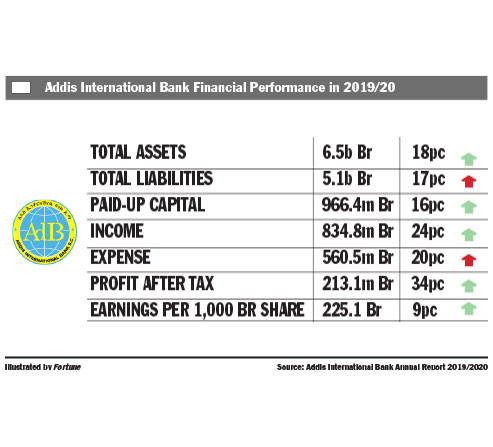
Viewpoints | Mar 09,2024
Jun 18 , 2022
By Girma Mamo
Regulatory and safety standards are not new to Ethiopia. But overlaps and poor implementation are arresting trade potentials, writes Girma Mamo, technical advisor to the Ministry of Trade & Regional Integration.
One can draw many hypotheses for the current inflationary pressure. Among them, market failures cannot be discounted. We have been observing several market failures that range from the flooding of markets with substandard imported clothes in the streets of Addis Abeba, to the prevalence of unstructured cartels that set the prices of goods and services.
When all of this happens, the usual scapegoats are "greedy" merchants and the prevalence of non-value-adding brokers. They are like the goat that had been sent to the desert carrying all the sins of the Israelites. The question here would be where the regulatory system has been as all of this was unfolding. It is crucial to dive into the regulatory and standard-setting system.
The history of standards is closely related to the history of humankind. Technical regulation and standardisation started thousands of years ago, even before the first proper standards were created.
“Do not use dishonest standards when measuring length, weight or quantity,” reads a passage in the Bible.
This statement can be regarded as technical regulation and puts moral and dogmatic sanctions on those who disobey. The current order of business is rooted in the implementation of standards and technical regulations; standardisation enables optimising resource allocation in market economies and the technical regulations help address market failures. Without standards and technical regulations, modern civilization would be much more difficult, costly, and hazardous.
International trade regimes promote the transaction of goods and services to be dictated by the market. This, in effect, discourages the implementation of non-market influences in transactions. In the context of the World Trade Organisation (WTO), the sanitary and phytosanitary measures (SPS) and the technical barrier to trade (TBT) agreements in particular aim to ensure that technical regulations, conformity assessment procedures, standards, and measures are transparent, non-discriminatory, and do not result in unnecessary trade barriers. The international trade regime also demands technical regulatory cooperation in setting the framework for implementation.
The framework defines technical regulations based on when the product has health and safety concerns, environmental impacts, or when it has fair trade issues. International regulatory cooperation thus focuses on regulatory effectiveness, economic efficiency, and administrative efficiency.
To elaborate this further in a context where domestic regulatory frameworks are limited in their reach, international regulatory cooperation may allow addressing challenges beyond a single regulator’s jurisdiction. It also may determine the undue frictions on global flows that policymakers and regulators may generate when developing and enforcing laws and regulations without considering the international environment. Regulatory cooperation may also help countries pool intelligence and resources together for issues that may be addressed domestically but benefit from global intelligence.
Historical evidence shows that Ethiopia had ancient trading relations with Egypt, Greece, Persia, India, and China. Despite its slow growth compared to its early international trading practice, the country has benefited from international trade. Since the enactment of the 1960 Commercial Code, the government has taken different measures to align its trade practice with the global market.
Recently, the government has been trying to facilitate ease of doing business to fulfill its strategic orientation. Since Ethiopia follows a free-market economy in principle, it is legitimate for the government to intervene in the market through the promulgation of mandatory standards and technical regulations, national security requirements, prevention of deceptive practices, and protection of human health and safety of flora and fauna.
However, Ethiopia's quality and safety regulating laws face challenges in meeting the supply of safe and quality products and services to the market. One can draw many reasons for this failure. A lack of a legal framework for effective implementation of regulation and the absence of referring standards are some of the most important. Others are poor communication and dissemination of the existing standards, the narrow focus of the regulatory system on the final products, and the prevalence of poor regulatory coordination.
Here one can mention two prominent paradigms to put all limitations under them. The first one is the institutional incompetence of some regulators in executing their duty, and the second one is the ambition of some regulators to expand their control. To mention an example, the Ministry of Trade & Regional Integration has the duty and responsibility to coordinate regulators for effective implementation.
However, as the Ministry could not properly carry out its responsibility, the business community suffered from redundant regulatory enforcement intervention. This and some other similar non-tariff measures have contributed to 96pc of trading companies reporting difficulties related to the application and implementation of non-tariff measures, according to a survey by the International Trade Centre (ITC) conducted six years ago.
In the second case, despite regulators having special competence and mission, they are often tempted to expand the scope of their control, which in effect causes an administrative burden both on the business community and themselves. For example, an edible agricultural product that enters the market can be asked for compliance by the Ministry of Agriculture (since it is an agricultural product), by the Food & Drug Authority (since it is an edible product), and by the Ministry of Trade & Regional Integration (since it is a commercial product).
This mandate overlap and different compliance requirements by various regulators were a concern for the private sector and it had been reflected at various stages. Furthermore, the business community has raised its concerns about the implementing capacity of pertinent government organs enforcing local regulatory requirements in line with the WTO TBT requirements.
The Trade Ministry is working to strengthen the regulatory enforcement activity by developing a national quality policy. It sets a clear orientation on quality and standard issues and enables it to take action against malpractices. However, the commitment of the Ministry to the realisation of the legal framework, personnel, and institutional capacity development interventions is yet to be proven.
As a nation, we need to adopt the international rule-making practice that foresees the impact of the proposed legislation from its economic impact, legality, and its additional administrative burden. The experience of international regulatory cooperation such as the OECD may be seen as a necessary strategy to bridge the gap between the domestic nature of rule-making and the increasingly international dimension of issues that laws and regulations aim to address.
As Ethiopia is working on the WTO accession process and has signed the Africa Continental Free Trade Agreement (AfCFTA), it is important to adopt the experience of OECD principles on international regulatory cooperation and economic and administrative efficiency.
PUBLISHED ON
Jun 18,2022 [ VOL
23 , NO
1155]


Viewpoints | Mar 09,2024

Viewpoints | Feb 13,2021

Fortune News | Apr 03,2021

Radar | Apr 27,2025

Agenda | Sep 28,2019

Fortune News | Apr 21,2025

Editorial | Oct 28,2023

Commentaries | Nov 21,2018

Sunday with Eden | Apr 13,2019

Viewpoints | Jun 03,2023

Photo Gallery | 171874 Views | May 06,2019

Photo Gallery | 162112 Views | Apr 26,2019

Photo Gallery | 151864 Views | Oct 06,2021

My Opinion | 136326 Views | Aug 14,2021





Dec 22 , 2024 . By TIZITA SHEWAFERAW
Charged with transforming colossal state-owned enterprises into modern and competitiv...

Aug 18 , 2024 . By AKSAH ITALO
Although predictable Yonas Zerihun's job in the ride-hailing service is not immune to...

Jul 28 , 2024 . By TIZITA SHEWAFERAW
Unhabitual, perhaps too many, Samuel Gebreyohannes, 38, used to occasionally enjoy a couple of beers at breakfast. However, he recently swit...

Jul 13 , 2024 . By AKSAH ITALO
Investors who rely on tractors, trucks, and field vehicles for commuting, transporting commodities, and f...

Oct 4 , 2025
Eyob Tekalegn (PhD) had been in the Governor's chair for only weeks when, on Septembe...

Sep 27 , 2025
Four years into an experiment with “shock therapy” in education, the national moo...

Sep 20 , 2025
Getachew Reda's return to the national stage was always going to stir attention. Once...

Sep 13 , 2025
At its launch in Nairobi two years ago, the Africa Climate Summit was billed as the f...

Oct 5 , 2025 . By NAHOM AYELE
In Meqelle, a name long associated with industrial grit and regional pride is undergo...

Oct 5 , 2025 . By BEZAWIT HULUAGER
The federal government is set to roll out a new "motor vehicle circulation tax" in th...

Oct 5 , 2025 . By NAHOM AYELE
The Bank of Abyssinia is wrestling with the loss of a prime plot of land once leased...

Oct 5 , 2025 . By BEZAWIT HULUAGER
The Customs Commission has introduced new tariffs on a wide range of imported goods i...